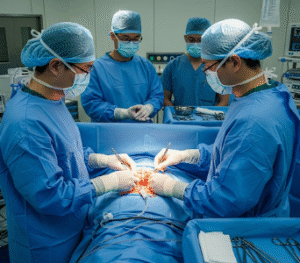Overview
Klinefelter Syndrome (KS) is a genetic condition that affects males, caused by the presence of an extra X chromosome (47,XXY instead of the usual 46,XY). It is one of the most common chromosomal disorders in males and impacts physical, developmental, and reproductive health. The syndrome is often underdiagnosed due to its variable presentation. In Korea, advanced genetic testing, endocrinology services, and multidisciplinary care programs provide early diagnosis, hormone therapy, fertility support, and tailored interventions to improve life quality for individuals with Klinefelter Syndrome.
What Is Klinefelter Syndrome?
Klinefelter Syndrome is a chromosomal disorder where males have one or more extra X chromosomes, most commonly 47,XXY. This additional genetic material interferes with normal testicular development, leading to low testosterone levels, impaired sperm production, and other clinical features. KS can present in infancy, childhood, or adulthood, with symptoms ranging from subtle to pronounced. Early diagnosis and treatment can mitigate many of the associated complications.
Symptoms
Symptoms vary but commonly include:
- Tall stature with long limbs and a somewhat less muscular body
- Small, firm testes and reduced testicular volume
- Gynecomastia (enlarged breast tissue)
- Low libido and erectile dysfunction
- Infertility or subfertility due to low sperm count or azoospermia
- Delayed or incomplete puberty
- Learning difficulties, speech and language delays, and social challenges
- Reduced facial and body hair
- Osteoporosis and increased risk of metabolic syndrome later in life
Causes
Klinefelter Syndrome results from nondisjunction during meiosis, leading to an extra X chromosome in the sperm or egg. This chromosomal anomaly is usually random and not inherited. The presence of the extra X chromosome affects the development and function of the testes and other systems through altered gene expression.
Risk Factors
- Advanced maternal age slightly increases the risk of nondisjunction during egg formation
- Family history is generally not a risk factor, as KS usually occurs sporadically
- No known environmental or lifestyle factors directly cause KS
Complications
- Infertility due to impaired spermatogenesis
- Increased risk of breast cancer and autoimmune diseases compared to typical males
- Metabolic syndrome including diabetes, obesity, and cardiovascular diseases
- Osteoporosis and increased fracture risk
- Psychosocial challenges including anxiety, depression, and social isolation
- Learning disabilities impacting academic achievement and employment
Prevention
As KS is a genetic condition, primary prevention is not possible. However:
- Prenatal genetic counseling and screening can identify affected fetuses early
- Early developmental assessments and interventions can improve outcomes
- Lifestyle modifications to manage metabolic risks and bone health
Treatment Options in Korea
Korea provides comprehensive care for Klinefelter Syndrome through multidisciplinary teams, including endocrinologists, urologists, geneticists, and psychologists:
- Hormone Replacement Therapy (HRT):
- Testosterone replacement starting in adolescence to induce secondary sexual characteristics, improve muscle mass, libido, and bone density.
- Monitoring and adjustment to optimize hormonal balance and minimize side effects.
- Fertility Treatments:
- Assisted reproductive technologies (ART) such as testicular sperm extraction (TESE) combined with intracytoplasmic sperm injection (ICSI) offer chances of biological fatherhood for some men.
- Educational and Psychological Support:
- Early speech therapy, learning support, and counseling for social and emotional development.
- Support groups and vocational training programs to enhance quality of life.
- Management of Comorbidities:
- Regular screening for metabolic syndrome, osteoporosis, and other health issues.
- Lifestyle counseling to promote healthy diet, exercise, and smoking cessation.
- Genetic Counseling:
- Guidance for affected individuals and families regarding inheritance patterns and reproductive options.
Korea’s advanced healthcare infrastructure ensures that individuals with Klinefelter Syndrome receive early diagnosis and personalized treatment plans, improving long-term health outcomes and social integration.













